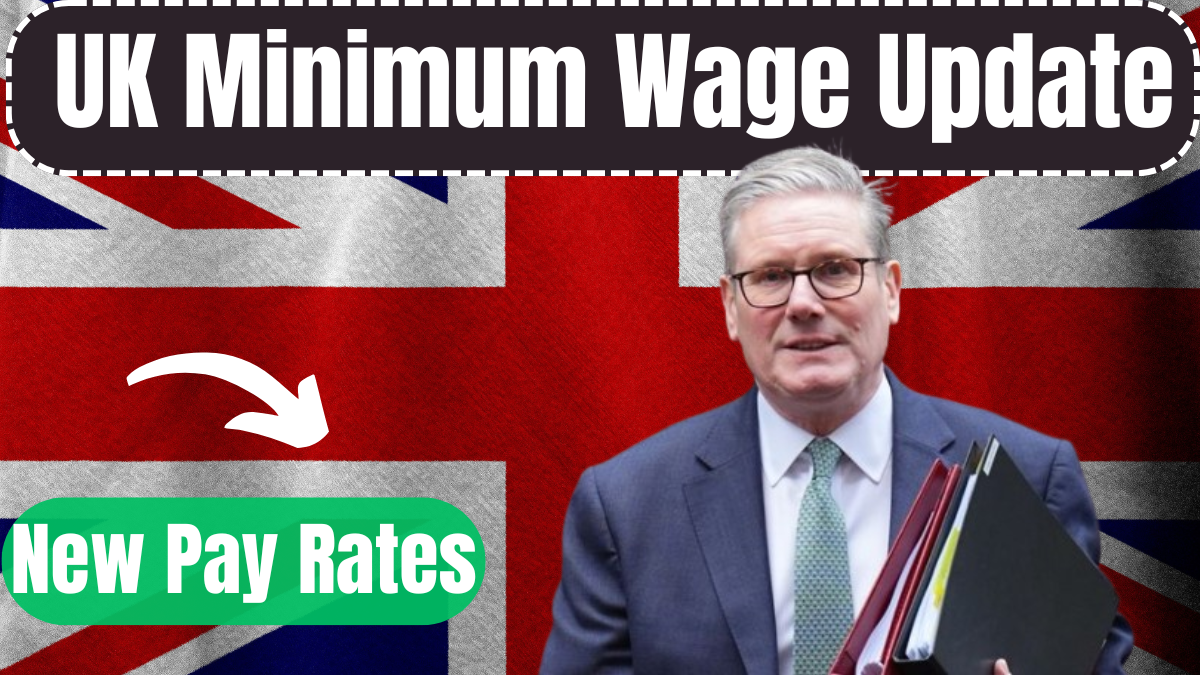Starting 1 April 2025, workers across the UK will see an increase in their earnings as the government rolls out a major update to both the National Minimum Wage (NMW) and National Living Wage (NLW). Designed to keep up with the rising cost of living, the updated pay structure reflects a push towards greater income equality and financial security—particularly for younger workers and apprentices.
The headline figure? The National Living Wage for adults aged 21 and over jumps from £11.44 to £12.21 per hour—a 6.7% increase. Younger employees and apprentices are also seeing significant hikes, aiming to close the wage gap between age groups and encourage broader workforce participation.

2025 Minimum Wage Rates at a Glance
| Category | 2024 Rate (£) | 2025 Rate (£) | Increase (£) | Increase (%) |
|---|---|---|---|---|
| National Living Wage (21+) | £11.44 | £12.21 | £0.77 | 6.7% |
| 18–20 Year Old Rate | £8.60 | £10.00 | £1.40 | 16.3% |
| 16–17 Year Old Rate | £6.40 | £7.55 | £1.15 | 18.0% |
| Apprentice Rate | £6.40 | £7.55 | £1.15 | 18.0% |
| Accommodation Offset (Daily) | £10.66 | £11.33 | £0.67 | 6.3% |
These increases will apply across England, Wales, Scotland, and Northern Ireland, benefiting millions of workers and reshaping payroll expectations for employers.
What Are the National Minimum Wage and National Living Wage?
The National Minimum Wage (NMW) is the legal minimum pay per hour almost all workers are entitled to, based on their age or employment status. The National Living Wage (NLW) applies to workers aged 21 and over and is typically higher to reflect increased financial responsibilities and living costs.
These rates are reviewed annually by the Low Pay Commission and aim to ensure fair compensation and reduce exploitation in the workplace.
Financial Benefits for Workers in 2025
For workers, the revised rates bring tangible financial rewards. A 21-year-old working full-time (37.5 hours per week) will now earn around £24,441 per year, up from £22,918—a notable increase of £1,523 annually.
Key Takeaways for Employees:
- Higher Weekly Wages: At 40 hours per week, workers aged 21+ will earn over £25,000 annually.
- Reduced Wage Gaps: Young workers and apprentices benefit from steeper percentage increases.
- Greater Financial Freedom: Extra income can help manage rising living costs, build savings, or reduce debt.
This is a vital step toward ensuring that minimum wage doesn’t equate to minimum lifestyle, especially as inflation and housing costs continue to rise across the UK.
Challenges and Responsibilities for Employers
While these wage increases are a win for employees, employers—especially in retail, hospitality, and care sectors—must prepare for the financial implications.
Top Challenges for Employers:
- Higher Wage Bills: Businesses may need to rework budgets and operating costs.
- Compliance Obligations: Updated rates must be reflected accurately from 1 April 2025.
- Risk of Fines: Non-compliance could result in penalties of up to £20,000 per underpaid worker.
Employers should act now to adjust their payroll systems, train HR teams, and communicate clearly with staff to avoid misunderstandings or legal issues.
Steps Employers Should Take Now
- Update Payroll Software: Ensure all systems are programmed with the new wage rates.
- HR Training: Equip staff to respond to employee queries and ensure internal compliance.
- Transparent Communication: Inform employees of their new pay rates and effective dates to build trust and confidence.
How Workers Can Protect Their Pay
If you’re an employee, it’s essential to stay informed and proactive. Double-check that your pay reflects the new rate from April 1st onward and report any discrepancies promptly.
Practical Tips for Workers:
- Verify Pay Slips: Cross-check hourly rates and hours worked to ensure accuracy.
- Know Your Rights: If you’re unsure, call the Acas helpline (0300 123 1100) for free advice.
- Budget Wisely: Use your increased income strategically—save, invest, or pay down debt.
- Seek Support If Needed: Programs like Universal Credit remain available if financial challenges persist despite the wage increase.
This update gives workers a much-needed boost, but it’s equally important to be proactive in ensuring you receive the full benefit of these changes.
FAQs
When will the new UK minimum wage rates take effect?
The new minimum wage rates will be implemented starting 1 April 2025 across the UK.
Who qualifies for the National Living Wage in 2025?
All workers aged 21 and over are entitled to the National Living Wage of £12.21 per hour.
Are apprentices included in the wage increase?
Yes, apprentices will now earn £7.55 per hour, up from £6.40—an 18% increase.
What happens if an employer doesn’t pay the new rates?
Employers could face fines up to £20,000 per underpaid employee and be publicly named by the government.
Do part-time and casual workers benefit from this increase?
Yes, all eligible workers—including part-time and zero-hour contract employees—must be paid the new minimum rates.
What is the accommodation offset, and how does it affect pay?
If your employer provides accommodation, they can offset £11.33 per day from your wages—but only within legal limits.
Where can I report underpayment or wage issues?
You can contact Acas or the HMRC National Minimum Wage team for help investigating wage disputes.
How does this affect employers in low-margin industries?
Sectors like retail and hospitality may see increased operational costs, requiring strategic budget adjustments or price changes.
Click here to know more.
Aanchal is a passionate writer with a keen interest in storytelling, content creation, and creative expression. She enjoys exploring diverse topics and crafting engaging narratives that captivate readers.